-
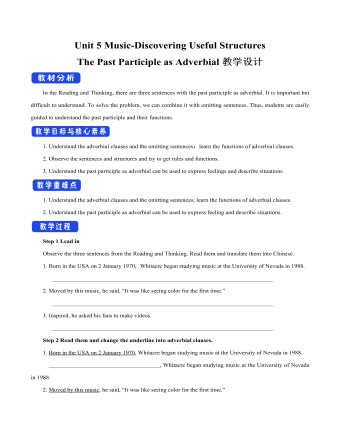
新人教版高中英语必修2Unit 5 Music-Discovering Useful Structures教案二
4. When he got absorbed in his world of music, he felt as if he could “see” the beauty of the world around him, like he had in his previous life.P·P as adverbial: _________________________________________________________________.Function: _______________________________________________________________________.Step 5 Solid Complete the passage with the words in brackets in their correct forms.Well known as a successful band, the Impact members show quite a few striking qualities. They never ever give up. When _____________(question) by the media, they are not _____________(discourage) and practise even harder. They are improving themselves by attending several master training class. They are united. _____________(fill with) team spirit, they act as a whole, always aiming for glory. Step 6 Difference and similarity from -ingObserve the following examples.1. He went out, shutting the door behind him.=He went out, ________________________________________________________.2. Not knowing what to do, he went to his parents for help.=__________________________________________, he went to his parents for help.Similarity: _______________________________________________________________________________________________________________________________________________________.Difference : _______________________________________________________________________________________________________________________________________________________.Step Practice1. ________ in a hurry, this article was not so good. 因为写得匆忙, 这篇文章不是很好。2. ________ carefully, he found something he hadn’t known before. 他仔细读书时, 发现了一些从前不知道的东西。3. ________ why he did it, the monitor said it was his duty. 当被问及他为什么要这么做时, 班长说这是他的职责
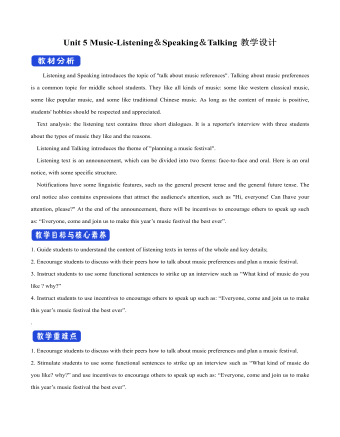
新人教版高中英语必修2Unit 5 Music-Listening&Speaking&Talking教案
choir memberspeople to run food stands people to sell festival ticketspeople to sell music CDspeople to set up equipmentmusical performersStep 2: Listen to the announcement again and answer the questions. ? 1. What kind of songs will Grace Davis sing at the festival?? 2. Who can try out as a performer?? 3. What can those who think they do not have musical talent do?? 4. How can students volunteer to take part?? Talking about preferences:? Would you prefer doing ..?? What would you prefer to do?? Would you rather do .... or ….?? What would you rather do?? I'd prefer .... to ..? I'd rather have ... than .. Step 3: Speaking ProjectWork in groups. Role-play the conversation or make a new one.? Debbie: Where have you been? You missed the announcement about the music festival.? John: I was at the doctor's office. Music festival?? Frank: Yes, it's going to be next month on the school sports field. John, you can play the piano. How about playing it at the festival?? John: Well, I'd rather play the violin. I can play Liang Zhu.? Frank: Wow! Sounds good. What about you, Debbie? ? Debbie: Actually, I don't have much musical ability. I'd prefer just to help out with the crowds.? Frank: You can sell tickets or work at a food stand.? John: So can I assume that the aim of the festival is to raise money?? Debbie: Yes. All of the money will go to charity.
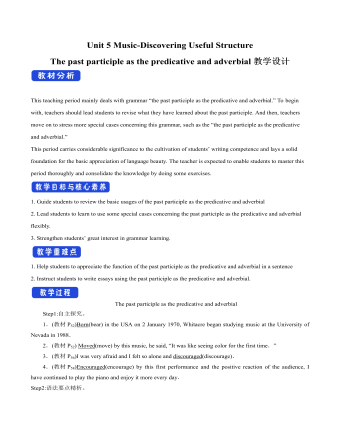
新人教版高中英语必修2Unit 5 Music-Discovering Useful Structures教案一
Step1:自主探究。1.(教材P52)Born(bear) in the USA on 2 January 1970, Whitacre began studying music at the University of Nevada in 1988.2.(教材P52) Moved(move) by this music, he said, “It was like seeing color for the first time.”3.(教材P56)I was very afraid and I felt so alone and discouraged(discourage).4.(教材P58)Encouraged(encourage) by this first performance and the positive reaction of the audience, I have continued to play the piano and enjoy it more every day.Step2:语法要点精析。用法1:过去分词作表语1).过去分词可放在连系动词be, get, feel, remain, seem, look, become等之后作表语,表示主语所处的状态Tom was astonished to see a snake moving across the floor.汤姆很惊讶地看到一条蛇正爬过地板。Finally the baby felt tired of playing with those toys.终于婴儿厌倦了玩那些玩具。注意:1).过去分词作表语时与被动语态的区别过去分词作表语时,强调主语所处的状态;而动词的被动语态表示主语是动作的承受者,强调动作。The library is now closed.(状态)图书馆现在关闭了。The cup was broken by my little sister yesterday.(动作)昨天我妹妹把杯子打碎了。2)感觉类及物动词的现在分词与过去分词作表语的区别过去分词作表语多表示人自身的感受或事物自身的状态,常译作“感到……的”;现在分词多表示事物具有的特性,常译作“令人……的”。
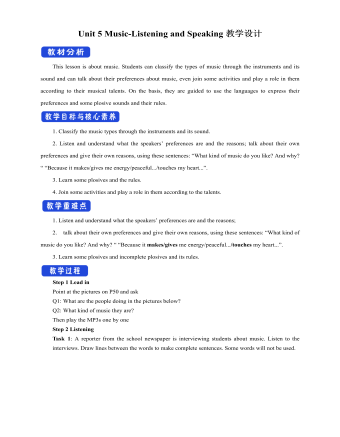
新人教版高中英语必修2Unit 5 Music-Listening and Speaking教案
This lesson is about music. Students can classify the types of music through the instruments and its sound and can talk about their preferences about music, even join some activities and play a role in them according to their musical talents. On the basis, they are guided to use the languages to express their preferences and some plosive sounds and their rules.1. Classify the music types through the instruments and its sound.2. Listen and understand what the speakers’ preferences are and the reasons; talk about their own preferences and give their own reasons, using these sentences: “What kind of music do you like? And why? “ “Because it makes/gives me energy/peaceful.../touches my heart...”.3. Learn some plosives and the rules.4. Join some activities and play a role in them according to the talents. 1. Listen and understand what the speakers’ preferences are and the reasons;2. talk about their own preferences and give their own reasons, using these sentences: “What kind of music do you like? And why? “ “Because it makes/gives me energy/peaceful.../touches my heart...”.3. Learn some plosives and incomplete plosives and its rules.Step 1 Lead inPoint at the pictures on P50 and ask Q1: What are the people doing in the pictures below?Q2: What kind of music they are?Then play the MP3s one by oneStep 2 ListeningTask 1: A reporter from the school newspaper is interviewing students about music. Listen to the interviews. Draw lines between the words to make complete sentences. Some words will not be used.
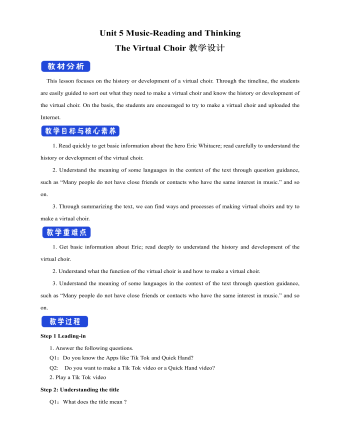
新人教版高中英语必修2Unit 5 Music-Reading and Thinking教案二
1. Get basic information about Eric; read deeply to understand the history and development of the virtual choir.2. Understand what the function of the virtual choir is and how to make a virtual choir.3. Understand the meaning of some languages in the context of the text through question guidance, such as “Many people do not have close friends or contacts who have the same interest in music.” and so on.Step 1 Leading-in1. Answer the following questions.Q1:Do you know the Apps like Tik Tok and Quick Hand?Q2: Do you want to make a Tik Tok video or a Quick Hand video?2. Play a Tik Tok video Step 2: Understanding the title Q1:What does the title mean ?Q2: Is the article a narration or exposition? Why? Q3: Can you change the title ? If you can, what is the title?Step 3: Scanning the whole text and getting the basic information1. Answer the following questions.Q1:Who came up with the idea for a virtual choir?Q2: Where did Eric studied the musical composition?Q3: What is his song?2. Find the main idea of each paragraph3. Deal with some new words.Step 4: Reading carefully to get detailed informationPara 1 How to make a virtual choir1. PreparationA. tools: a virtual camera; an Internet connectionB. hero/heroin: friends or some individuals who have the same interests2. Process
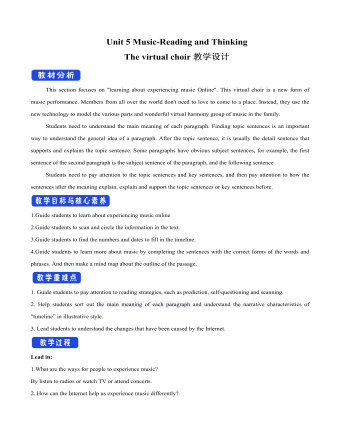
新人教版高中英语必修2Unit 5 Music-Reading and Thinking教案一
This section focuses on "learning about experiencing music Online". This virtual choir is a new form of music performance. Members from all over the world don't need to love to come to a place. Instead, they use the new technology to model the various parts and wonderful virtual harmony group of music in the family. Students need to understand the main meaning of each paragraph. Finding topic sentences is an important way to understand the general idea of a paragraph. After the topic sentence, it is usually the detail sentence that supports and explains the topic sentence. Some paragraphs have obvious subject sentences, for example, the first sentence of the second paragraph is the subject sentence of the paragraph, and the following sentenceStudents need to pay attention to the topic sentences and key sentences, and then pay attention to how the sentences after the meaning explain, explain and support the topic sentences or key sentences before.1.Guide students to learn about experiencing music online2.Guide students to scan and circle the information in the text.3.Guide students to find the numbers and dates to fill in the timeline.4.Guide students to learn more about music by completing the sentences with the correct forms of the words and phrases. And then make a mind map about the outline of the passage.1. Guide students to pay attention to reading strategies, such as prediction, self-questioning and scanning.2. Help students sort out the main meaning of each paragraph and understand the narrative characteristics of "timeline” in illustrative style.3. Lead students to understand the changes that have been caused by the Internet.
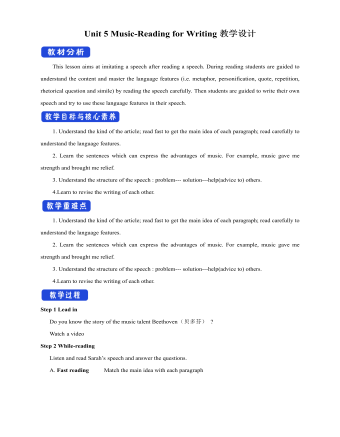
新人教版高中英语必修2Unit 5 Music-Reading for Writing教案二
The Internet celebrity Gao Yifeng. Years ago, he owned 5 companies and the staffs over 1,000, but during the economy crisis, he became nothing but debt. He was so worried that his hair became white overnight. There was a time when he wanted to killed himself. But after listening to the song Start Over by Liu Huan, he decided to cheer himself up. He started a steamed bun shop and gradually became a national chain shops. Now he became successful again.Walter Haddon said, “Music is the medicine of a troubled mind.” Music contains such a pleasant and inspiring force. Music gave him courage and bravery. When he listened to the song, it made his spirit fly like a kite in the wind. Music gave him strength and brought him relief. It was the rock I leant on to become strong and to get through those hard times. I hope none of us have to go through the same kind of suffering that he did. At the same time, we all go through various periods when we feel sad or alone. During those times, music can help us in the same way that it helped him. I hope we all will somehow begin to treasure music and make it a part of our life. Thank you for your listening !5.Revise your writing each other.Does he/she explain how music has changed his/her/someone else’s life?Are some of the rhetorical devices included and used properly ?Does he/she talk about how music makes him/her/someone feel?Is the first word in each sentences capitalised?Does he/she use correct punctuation ?
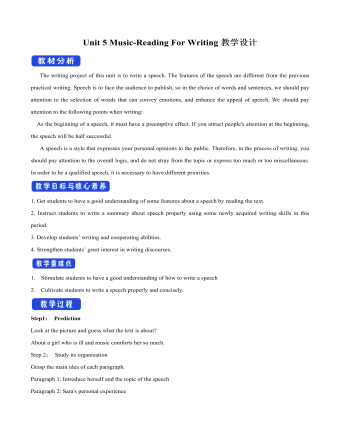
新人教版高中英语必修2Unit 5 Music-Reading For Writing教案一
(4)Now we have heard a number of outstanding speeches ... 我们已经聆听了许多精彩的发言……(5)Because we wanted the nations of the world, working together, to deal with ... 因为我们希望全世界各国团结起来去应对……(6)And if we do not act ... 如果我们不采取行动……(7)Now, I share the concerns that have been expressed ... 我也同意对于……表达的担心(8)Let us show the world that by working together we can ... 让我们告诉全世界,通过一起努力我们可以……(9)It is now time for us to ... 是时候我们……(10)And I have always wished that ... 我一直希望……(11)Thank you for letting me share this day with me.感谢你们和我共度这一天。实践演练:假如你是高中生李华,你校将举办一次以“音乐”为主题的演讲比赛,请你按照主题,写下你的演讲稿。注意:词数100左右。First of all, thank you for listening to my speech. My topic is: love music like love yourself.Music is like the air we need to maintain our normal lives around us. You can't imagine how terrible a world without music would be. Movies and TV shows have no music, only dry conversations and scenes; mobile phones only vibrations; streets only noisy crowds; cafes, western restaurants only depressed meals. What a terrible world it is!As a student, I hope we all can enjoy the fun brought by music in our spare time. Instead of just listening to music, we can even make our own music. Let's enjoy the fun of music!Thanks again for your attention!

人教版高中历史必修2罗斯福新政教案
【教学参考】对“新政”作用的评价史学界对“新政”作用的评价是仁者见仁、智者见智,但基本上有三种观点,即“功大于过论”、“过大于功论”和“功过参半论”。持“功大于过论”者认为“新政”在美国历史上基本上是一种进步现象,首先,“新政”挽救了危机,使美国人民摆脱了危机的困苦局面;其次,在缺少足够的宏观经济政策知识的时代,罗斯福所做的努力确实是开创性的;再次,罗斯福“新政”开启了美国以后历届政府实施国家干预政策的大门,成为缓解自由主义经济制度之弊病的一剂良方,并在实质上加强了美国联邦政府的权威;最后,在30年代资本主义世界经济危机的背景下,同日本、德国为转嫁危机而发动战争的策略相比,“新政”无疑代表了一种进步、民主的解救危机方式。持“过大于功论”者认为“新政”未能使美国走出萧条、步入繁荣。
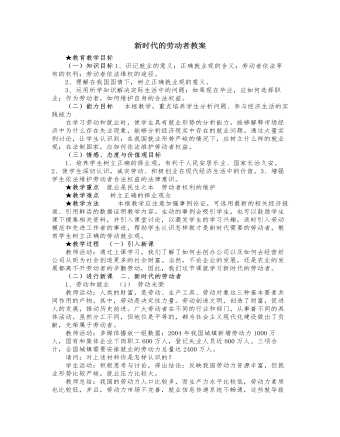
人教版高中政治必修1新时代的劳动者教案
总之,依法维护劳动者合法权益,是保障劳动者主人翁地位的前提,是充分调动劳动者积极性、创造性,使之成为改革开放和社会主义建设主力军的保证。也是促进劳动力资源合理配置,促进经济持续、快速、健康发展的需要。(三)课堂总结、点评★课余作业某企业由于生产任务较大,在未经劳动行政部门批准的情况下,厂长强行让部分职工延长劳动时间,每天加时工作,星期天也照常上班,不让休息。到月底,部分职工全月累计加班加点高达120小时,也不发加班工资。根据上述材料回答:你认为该厂的做法是否合法?为什么?劳动者依法享有哪些权利?该厂的做法侵害了劳动者的哪些权利?这些工人应当怎么办?★教学体会本节学习劳动者的权利和树立什么样的就业观等问题,与大家的生活联系比较密切。因此,在讲解过程中要通过大量的实例和对比,引导学生思考和讨论,将市场经济中的一些理论知识潜移默化的给学生。
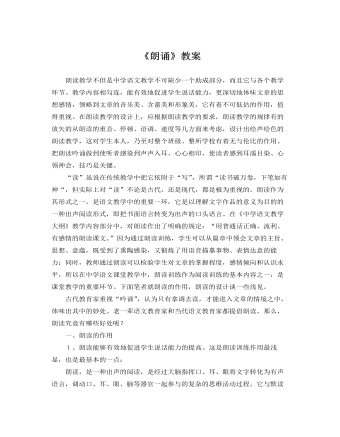
人教版高中语文必修1《朗诵》教案
教师在教学古诗时,只有指导学生反复朗读,才能让学生直接体会到古诗所具有的音乐美,增强学生对古诗的美学感染力,进一步激发学生学习古诗词的热情。除此,在《荷塘月色》、《春》等优美的写景抒情散文中,朱自清运用了不少的叠词,朗读它们,犹如一个个跳动的音符贯穿于文章中,有效地增强了文章的节奏感。通过朗读,学生能够更好地领悟到朱自清散文所具有的音乐美。4、朗读能够增强学生对文章含蓄美和形象美的感染能力:含蓄,是指用少量的、具体的、可感触的艺术形象,来表现丰富的生活内容和思想感情,把诗意藏在富于概括性和内涵丰富的形象中,以瞬间表现永恒,以有限传达无限,以少胜多,给人以推理和想象的广阔大地。“读书百遍,其义自见”,“熟读唐诗三百首,不会作诗也会吟”,“观书须熟读,使其言皆者出于吾云之口;继以精思,使其意皆出于吾之心。”这些话语道出了反复朗读对于理解文章含义所起的重要作用。教师在课堂教学过程中,特别是地教学诗歌时,只有指导学生反复地朗读,才能让学生将文章中隽永的意境,深厚的蕴涵更好地品味出来,从而更好地欣赏到文章的含蓄美。
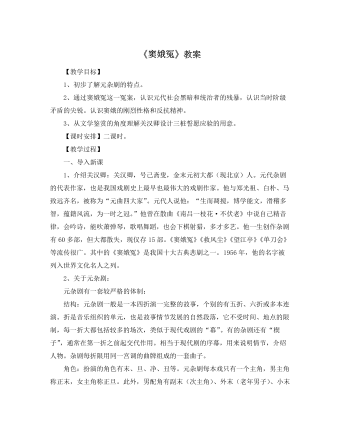
人教版高中语文必修4《窦娥冤》教案
窦娥的三桩誓愿明明是幻想,却偏偏写成现实,明明是不合理的偏偏写成合理的,这说明了什么?明确:这说明在当时的历史条件下,除了乞求天地鬼神申诉冤屈以外,没有别的办法,作者采用这种浪漫主义的表现手法,一是表明社会的腐败黑暗,二是刻画窦娥强烈的反抗精神,三是表达人民要惩治邪恶的愿望。“煞”就是结尾的曲牌,为什么关汉卿要把“煞”分成[二煞][一煞][煞尾]三个曲牌呢?明确:说明蓄积在窦娥胸中的怒火再也无法控制,犹如地下岩浆,冲向决口。也说明剧作家意犹未尽,他要把窦娥的无辜受害,要把人们对窦娥的同情,要把人们对统治者的愤恨表现得痛痛快快,淋漓尽致。于是在结尾处一波三折,把高潮推向顶峰。《窦娥冤》中有两句唱词,两个牌文本不同,试分析其优劣。《古名家杂剧》本:地也,你不分好歹难为地;天也,我今日负屈衔冤哀告天。
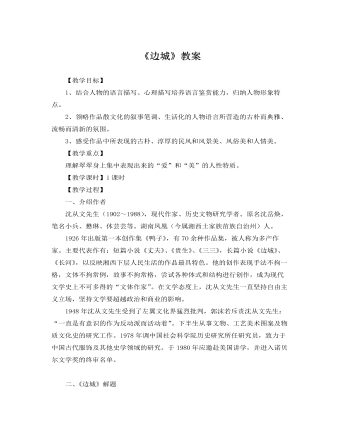
人教版高中语文必修5《边城》教案
【教学过程】一、介绍作者沈从文先生(1902~1988),现代作家、历史文物研究学者。原名沈岳焕,笔名小兵、懋琳、休芸芸等。湖南凤凰(今属湘西土家族苗族自治州)人。1926年出版第一本创作集《鸭子》,有7O余种作品集,被人称为多产作家。主要代表作有:短篇小说《丈夫》、《贵生》、《三三》,长篇小说《边城》、《长河》,以反映湘西下层人民生活的作品最具特色。他的创作表现手法不拘一格,文体不拘常例,故事不拘常格,尝试各种体式和结构进行创作,成为现代文学史上不可多得的“文体作家”。在文学态度上,沈从文先生一直坚持自由主义立场,坚持文学要超越政治和商业的影响。1948年沈从文先生受到了左翼文化界猛烈批判,郭沫若斥责沈从文先生:“一直是有意识的作为反动派而活动着”。下半生从事文物、工艺美术图案及物质文化史的研究工作。1978年调中国社会科学院历史研究所任研究员,致力于中国古代服饰及其他史学领域的研究。于1980年应邀赴美国讲学,并进入诺贝尔文学奖的终审名单。
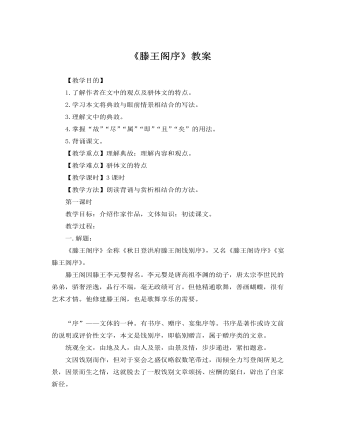
人教版高中语文必修5《滕王阁序》教案
⒈作者是如何写洪州的地理风貌的?突出了什么特点?明确:“豫章故郡,洪都新府。”――历史久远“星分翼轸,地接衡庐”――界域辽阔。“襟三江而带五湖,控蛮荆而引瓯越”――地势宏伟2.作者怎样写参加宴会的人物,照应了前文的哪个词语?明确:作者在写参加宴席人物时,用了“雅望”“懿范”“胜友”“高朋”“腾蛟起凤”“紫电清霜”等词语,极尽人物的文韬武略,照应了前文的“俊采”一词。3.文章开始不写楼台,不写宴会,而先写地势与人物,这样写有何好处?明确:文章借用铺陈的手法,历叙界域之大,地势之雄,物产丰富,人才俊美,既渲染了和乐的氛围、宴会的高雅,同时也紧扣照应了题目《秋日登洪府滕王阁饯别序》7.小结:本段略写洪州的地理风貌,极写滕王阁的无限壮美,和周围环境的超凡脱俗,以及阁中如云高朋的文才武略。这样写,既初步写出了滕王阁的不同凡响,又为后文详写做好了铺垫。
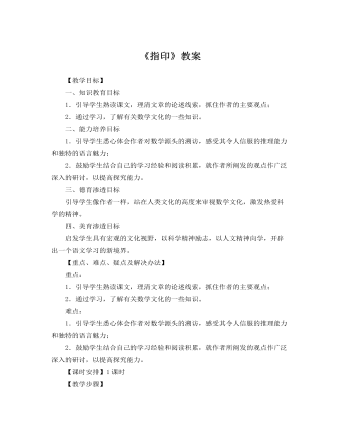
人教版高中语文必修5《指印》教案
一、明确目标1.引导学生熟读课文,理清文章的论述线索,抓住作者的主要观点;2.通过学习,了解有关数学文化的一些知识;3.引导学生悉心体会作者对数学源头的溯访,感受其令人信服的推理能力和独特的语言魅力;二、整体感知1.导入新课"屈指可数""弹指一挥见",手指在生活中的计数功能,直接催生了数学这门科学,丹齐克的《指印》为我们揭开了这二者的关系(板书课题)。2.作者及相关背景介绍丹齐克(1884-1956),原籍立陶宛,曾在巴黎大学求学。1910年去美国,入美国国籍,先后在哥伦比亚大学、约翰·霍普金斯大学、马里兰大学讲授数学。三、重点、难点的学习与目标达成过程1.感知课文,明确本文的整体写作思路。(1)学生读课文,整理文章的结构脉络。(2)小组交流讨论。
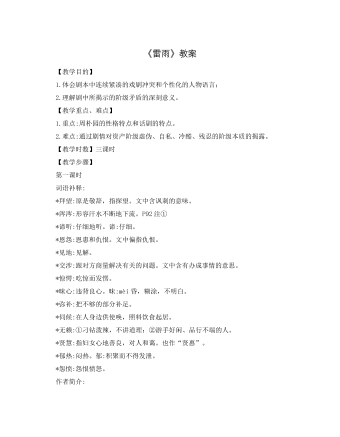
人教版高中语文必修4《雷雨》教案
节选部分结构:节选自第二幕,主要写周朴园与鲁家母子的对话,分两部分。第一部分:三十年后周朴园和侍萍再次相见。第一层:侍萍以叙述别人故事的口吻,揭露周朴园的罪恶,诉说自己的遭遇。──写他们过去的矛盾第二层:通过周朴园态度的变化,暴露他的伪善面目,表现侍萍这个劳动妇女的阶级本色。──写他们现在的矛盾第二部分:周朴园与鲁大海父子、侍萍与周萍母子见面。通过周朴园和鲁大海的激烈冲突,揭露周朴园压榨工人的罪行,反映工人阶级的反抗斗争。分段依据:第一部分从家庭生活方面来揭露周朴园;第二部分从社会生活方面来揭露周朴园。为了使周鲁两家三十年的新仇旧恨集中在一幕戏中得到反映,作者灵活地运用了“回顾”的方法,把历史和现实,过去和现在紧紧联系起来了,用以刻画人物性格,推动剧情发展。
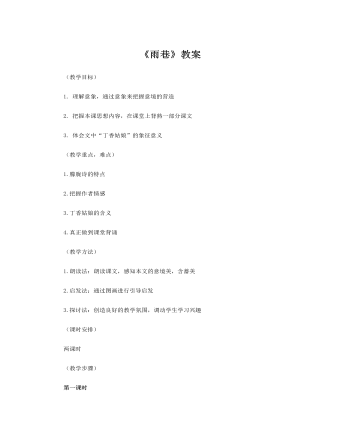
人教版高中语文必修1《雨巷》教案
(三)作家介绍,写作背景大家说“雨巷”这首诗写得美不美?(美)刚才我也说了,这首诗是中国朦胧诗的百年经典。那么对于这么出名的诗,有谁能够向我们介绍一下它的作者跟写作背景呢?(明确:戴望舒,原名戴朝实又名戴梦鸥,1905年出生于杭州。1929年4月出版第一本诗集《我底记忆》,他的成名作《雨巷》即收入此集中。1933年8月出版了《望舒草》1948年出版了《灾难岁月》一生留下了诗篇92首。《雨巷》是戴望舒的成名作和前期的代表作,他曾因此而赢得了“雨巷诗人”的雅号。这首诗写于1927年夏天。当时全国处于白色恐怖之汇总,戴望舒因曾参加进步活动而不得不避居于松江的友人家中,在孤寂中咀嚼着大革命失败后的幻灭与痛苦,心汇总充满了迷惘的情绪和朦胧的希望。)(适当板书)
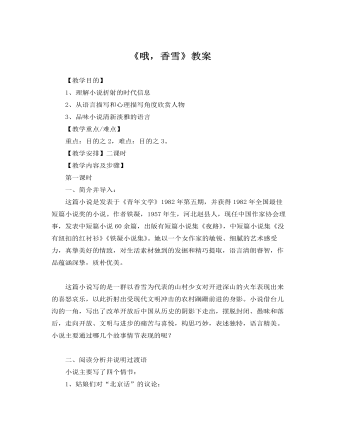
人教版高中语文必修5《哦,香雪》教案
【教学内容及步骤】第一课时一、简介并导入:这篇小说是发表于《青年文学》1982年第五期,并获得1982年全国最佳短篇小说奖的小说。作者铁凝,1957年生,河北赵县人,现任中国作家协会理事,发表中短篇小说60余篇,出版有短篇小说集《夜路》,中短篇小说集《没有纽扣的红衬衫》《铁凝小说集》。她以一个女作家的敏锐、细腻的艺术感受力,真挚美好的情致,对生活素材独到的发掘和精巧提取,语言清朗睿智,作品蕴涵深挚,质朴优美。这篇小说写的是一群以香雪为代表的山村少女对开进深山的火车表现出来的喜怒哀乐,以此折射出受现代文明冲击的农村蹒跚前进的身影。小说借台儿沟的一角,写出了改革开放后中国从历史的阴影下走出,摆脱封闭、愚昧和落后,走向开放、文明与进步的痛苦与喜悦,构思巧妙,表述独特,语言精美。小说主要通过哪几个故事情节表现的呢?
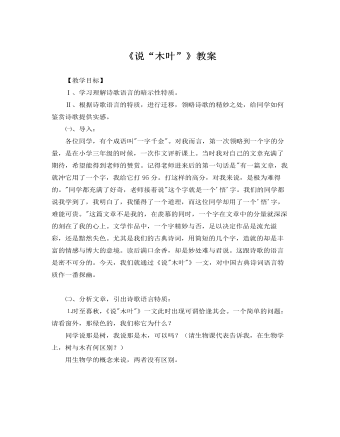
人教版高中语文必修5《说“木叶”》教案
【教学目标】Ⅰ、学习理解诗歌语言的暗示性特质。Ⅱ、根据诗歌语言的特质,进行迁移,领略诗歌的精妙之处,给同学如何鉴赏诗歌提供实感。㈠、导入:各位同学,有个成语叫"一字千金"。对我而言,第一次领略到一个字的分量,是在小学三年级的时候,一次作文评析课上。当时我对自己的文章充满了期待,希望能得到老师的赞赏。记得老师进来后的第一句话是"有一篇文章,我就冲它用了一个字,我给它打95分。打这样的高分,对我来说,是极为难得的。"同学都充满了好奇,老师接着说"这个字就是一个'悟'字。我们的同学都说我学到了,我明白了,我懂得了一个道理,而这位同学却用了一个'悟'字,难能可贵。"这篇文章不是我的,在羡慕的同时,一个字在文章中的分量就深深的刻在了我的心上。文学作品中,一个字精妙与否,足以决定作品是流光溢彩,还是黯然失色。尤其是我们的古典诗词,用简短的几个字,造就的却是丰富的情感与博大的意境。读后满口余香,却是妙处难与君说。这跟诗歌的语言是密不可分的。今天,我们就通过《说"木叶"》一文,对中国古典诗词语言特质作一番探幽。
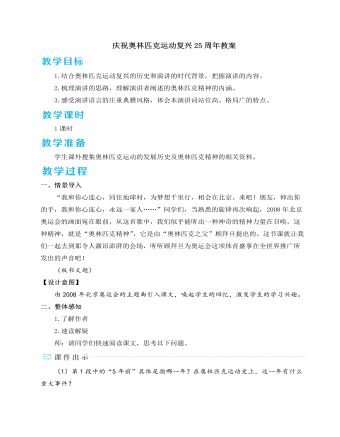
人教部编版语文八年级下册庆祝奥林匹克运动复兴25周年教案
(3)推荐男女生代表各一位在全班进行演讲展示。 (4)围绕“讲”和“演”两方面的技巧,点评演讲效果。(生开展演讲活动,师指导)【设计意图】本环节通过集中梳理演讲技巧,并设计演讲技巧进行演讲展示,引导学生将理论知识逐步运用于具体的演讲实践中,提高学生的演讲能力。五、总结存储1.教师总结现代奥林匹克运动的创始人顾拜旦面对世界政治格局剧变的局面,以战略家的视野指出奥林匹克精神的内涵与价值,用诗歌般的语言阐述了奥林匹克平和自信的内涵,提出了奥林匹克运动的宗旨是教育,是面向大众,是促进和平、公平、公正。他激情澎湃地畅想美好前景,确信奥林匹克精神必将如阳光般普照大地。整篇演讲词站位高、格局广,语言庄重、典雅,值得我们用心体会。2.布置作业学校即将举行春季运动会,如果你被邀请在运动会的开幕式上作为学生代表发言,你将如何演讲?结合你对奥林匹克运动的精神的理解,写一篇300字左右的演讲词,并适当设计一些演讲技巧。





















